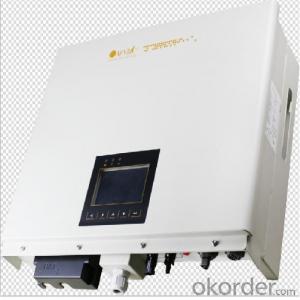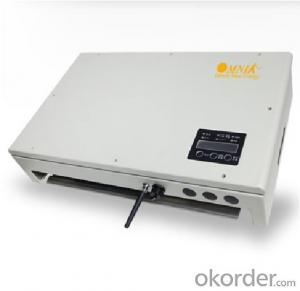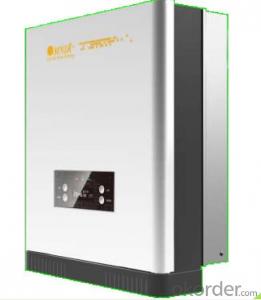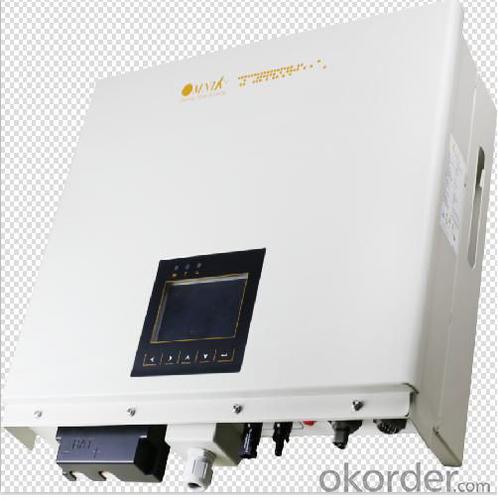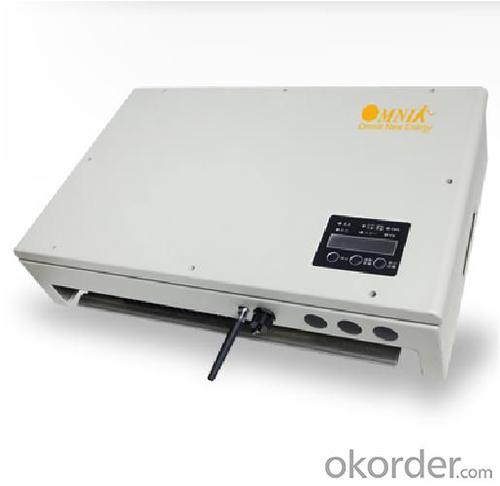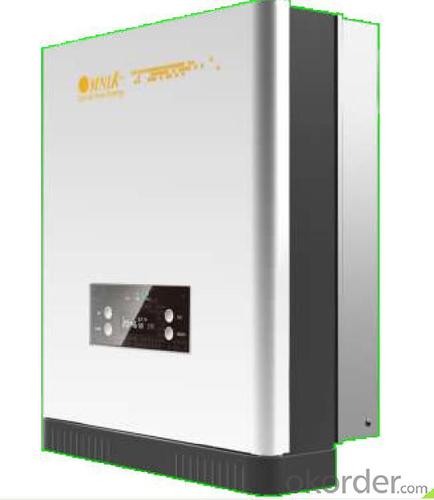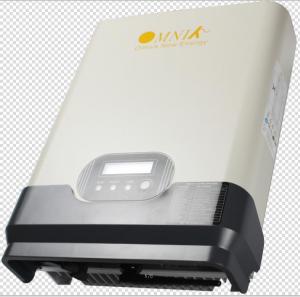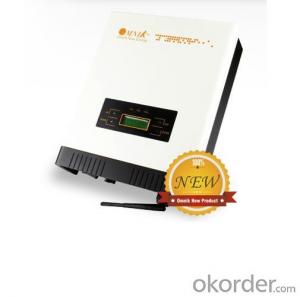Rv Solar Inverter Omniksol-5.0K-JP
- Loading Port:
- Shanghai
- Payment Terms:
- TT OR LC
- Min Order Qty:
- 5 pc
- Supply Capability:
- 3000 pc/month
OKorder Service Pledge
OKorder Financial Service
You Might Also Like
Omnik new energy solar inverter
Omniksol-2.0k-TL Photon Efficiency up to 3kW
in the world------ Photon tested Jan. 2012.
Omniksol-5k-JP
1.Futures
Omniksol-4k-JP PV inverter ,featuring two MPPT tracker, maximum converstaion efficiency 96.2%,off-grid to on grid mutual switch , IP 65 Protection design, easy installation , is special designed for Janpan consumer.
Features
Transformer design, high frequency isolation technology with high security
High efficiency (Max.96.2%), High MPPT accuracy(>99.9%)
2 MPPT design, reach the maximum output power
Wide DC input range (95-420 Vdc),lower start voltage 65Vdc
on-grid/ off grid switch function
IP 65 design, suitable for indoor and outdoor installation
10 years warranty(10~25 years as option)
2.Technical data:
Inverter Type | Omniksol-3k-TL | Omniksol-4k-TL | Omniksol-5k-TL | |
| Input(DC) | Max.PV Input voltage[V] | 450 | ||
| Input Voltage Range(MPPT)[V] | 95-420 | |||
| Operation voltage Range[V] | 75-420 | |||
| Rating Input voltage[V] | 280 | |||
| Wake Up voltage[V] | 65 | |||
| Number of MPPT Trackers | 2 | |||
| Input Power Limitation[W] | 1600 | 2100 | 2600 | |
| Input Current Limitation[A] | 8 | 10 | 12 | |
| MPPT Efficiency | 99.90% | |||
| Efficiency | >96% | >96% | >96.2% | |
| Input Switch[A] | 8 | 10 | 12 | |
3. On grid solar inverter Omniksol-5.0k- JP Certificate
JET
CE
4. On grid solar inverter Omniksol-5.0k- JP outlook
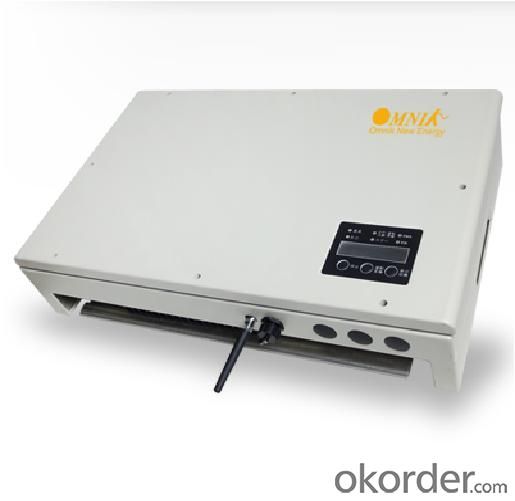
- Q: How does a solar inverter handle varying solar irradiance levels?
- A solar inverter handles varying solar irradiance levels by continuously monitoring the incoming solar energy and adjusting its operations accordingly. It converts the direct current (DC) produced by solar panels into alternating current (AC) that can be used to power electrical devices. When the solar irradiance levels are high, the inverter optimizes the power output to match the maximum potential of the solar panels. Conversely, during low solar irradiance, the inverter adjusts its operations to ensure optimal efficiency and power generation. This adaptive nature of solar inverters allows them to efficiently harness solar energy under varying conditions.
- Q: What is the role of a solar inverter in a solar-powered ventilation system?
- The role of a solar inverter in a solar-powered ventilation system is to convert the direct current (DC) electricity generated by the solar panels into alternating current (AC) electricity, which is the type of electricity used in most household appliances. This conversion allows the ventilation system to effectively utilize the solar energy and power the fans, motors, or other components of the system.
- Q: Can a solar inverter be used with a generator?
- Yes, a solar inverter can be used with a generator. The solar inverter can convert the DC power produced by the generator into AC power, allowing it to be used to power electrical appliances and devices. This can be useful in situations where solar energy is not available or during power outages when the generator can serve as a backup power source.
- Q: What is the cost of a solar inverter?
- The cost of a solar inverter can vary depending on factors such as the brand, capacity, and features. Generally, residential solar inverters can range from a few hundred dollars to a couple of thousand dollars. Commercial-grade inverters can cost several thousand dollars to tens of thousands of dollars. It is recommended to consult with a solar installer or supplier to get an accurate cost estimate based on your specific requirements.
- Q: What is the difference between a PV grid-connected inverter and an off-grid inverter?
- Offline generally need energy storage, not to send energy online. Power grid has no right to interfere.
- Q: Can a solar inverter be integrated with a smart home system?
- Yes, a solar inverter can be integrated with a smart home system. Many modern solar inverters have built-in communication capabilities, such as Wi-Fi or Ethernet, which allow them to connect to a smart home system. This integration enables homeowners to monitor and control their solar power production and energy consumption conveniently through a centralized smart home platform. They can track energy production, set energy usage preferences, and even automate certain functions based on available solar power.
- Q: Can a solar inverter be used with different types of grid support functions?
- Yes, a solar inverter can be used with different types of grid support functions. Solar inverters are designed to convert the direct current (DC) produced by solar panels into alternating current (AC) that can be fed into the electrical grid. They can be configured to provide various grid support functions such as reactive power control, voltage and frequency regulation, and anti-islanding protection. These functions allow solar inverters to actively support the stability and reliability of the grid, regardless of the specific requirements of the grid system.
- Q: Can a solar inverter be used with solar-powered electric vehicle charging stations?
- Yes, a solar inverter can be used with solar-powered electric vehicle charging stations. A solar inverter is necessary to convert the DC (direct current) power generated by solar panels into AC (alternating current) power that can be used by electric vehicle charging stations. This allows the solar power to be fed into the charging station and used to charge electric vehicles.
- Q: What is the role of a solar inverter in a grid-tied system?
- The role of a solar inverter in a grid-tied system is to convert the direct current (DC) electricity generated by the solar panels into alternating current (AC) electricity that is compatible with the electrical grid. It also ensures the synchronization and stability of the solar power system with the grid, allowing excess energy to be fed back into the grid and enabling the system to draw power from the grid when needed.
- Q: What are the different types of solar inverters available?
- There are several types of solar inverters available, including string inverters, microinverters, and power optimizers.
Send your message to us
Rv Solar Inverter Omniksol-5.0K-JP
- Loading Port:
- Shanghai
- Payment Terms:
- TT OR LC
- Min Order Qty:
- 5 pc
- Supply Capability:
- 3000 pc/month
OKorder Service Pledge
OKorder Financial Service
Similar products
Hot products
Hot Searches
Related keywords
